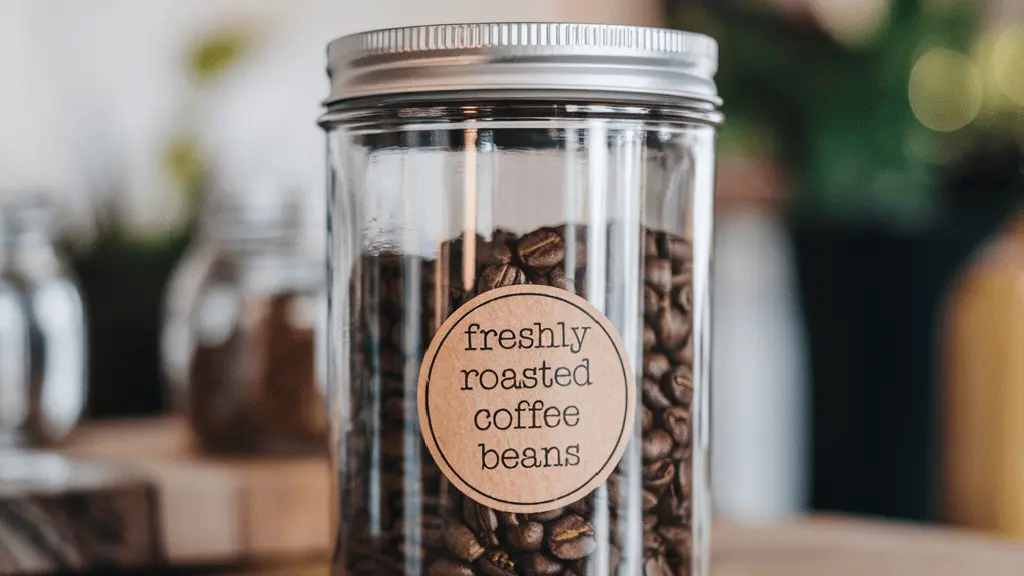There is probably nothing worse than stale beans spoiling a perfect cup of coffee for the coffee lover. Proper storage, however, can make a difference, helping preserve the flavor and aroma of the beans for as long as possible. In this guide, we share easy and practical tips that help you store coffee beans like a pro.
Why Coffee Bean Freshness Matters
The freshness of the coffee beans peaks shortly after roasting. During this period, carbon dioxide is released from the beans (a process known as degassing), and the flavors become the best they can be. However, these beans quickly lose their quality in the presence of air, moisture, heat, and light. Proper storage helps your coffee remain rich in taste and aroma. Fresh coffee doesn’t only create a well-balanced, aromatic brew but also ensures that your coffee experience will always be consistent.
Freshness is vital because coffee beans are a natural product that degrades over time, similar to all other edible items. As they age, the oils and compounds responsible for their flavor and aroma break down. Thus, this results in a loss of complexity and vibrancy, ultimately producing a dull, lackluster cup. Proper storage is non-negotiable for any serious coffee aficionado who would like to taste their coffee at its best.
Factors That Affect Coffee Freshness
Several environmental factors contribute to the degradation of coffee beans, and understanding these can help you take preventive measures. Oxygen is perhaps the biggest enemy of coffee. Exposure to air initiates oxidation, a chemical reaction that diminishes the beans’ flavor and aroma. Even minimal exposure can have a noticeable effect over time.
Moisture is the other critical one. Coffee beans are porous; hence, they can absorb water from the air. This not only reduces their flavor but also leads to mold growth at extreme levels. Heat accelerates the breakdown of oils in beans, while exposure to light could cause similar breakdowns through chemical reactions that degrade the quality of beans.
Learn How Water Affects Your Coffee’s Taste
Best Storage Practices for Coffee Beans
The most effective way to keep coffee beans fresh is to minimize their exposure to the elements. Airtight containers are a must-have for any coffee enthusiast. These containers create a barrier against oxygen and moisture, two of the main culprits of staleness. Opt for opaque containers to block out light, as even brief exposure can impact the beans’ integrity.
Store your container in a cool, dark place like a pantry or cupboard. Avoid areas near heat sources, such as ovens or windowsills, as temperature fluctuations can damage the beans. Consistency in temperature is essential; even minor fluctuations can accelerate the aging process.
This sounds quite logical; refrigerate the coffee beans, after all. However, refrigerating coffee beans is discouraged. Refrigerators are humid, and the exposure to moisture is a high risk. Coffee beans also absorb smells from other food products, and the flavor may be affected. Instead, purchase the coffee in an amount you can consume in two to three weeks to keep the freshness intact.
Freezing Coffee Beans: A Controversial Option
Coffee enthusiasts often debate the topic of freezing coffee beans. When done properly, freezing extends the shelf life of unopened coffee. The secret lies in how the beans are stored. Divide them into small, airtight portions before freezing to avoid repeated exposure to air when thawed. Vacuum-sealed bags or containers help minimize the risk of condensation, which can damage the beans once they are removed from the freezer.
Once thawed, beans should be used immediately and not refrozen. Freezing is best reserved for situations where you’ve purchased a large quantity of coffee and won’t be able to consume it within the recommended timeframe.
Choosing the Right Coffee Storage Container
The freshness of your coffee beans depends largely on the storage container you choose. Choose airtight ones that are made from materials such as stainless steel or ceramic, which do not absorb smells. You can use plastic, but they must be food-grade and smell-free to ensure the coffee will not absorb the smells from the containers.
Perfectly for freshly roasted beans, and one-way valve containers, the valves enable the carbon dioxide to escape and do not let oxygen in, especially during the degassing period. This ensures that the beans stay fresh without pressure building up inside the container.
For more information, check How to Choose a Coffee Maker
How Long Do Coffee Beans Stay Fresh?
Freshness depends on the storage of coffee beans. They are usually best consumed within one to two weeks from the date of roasting. At this time, flavors are at their best, offering a vibrant coffee experience. By the third and fourth week, the beans may still produce a decent cup, but the complexity of the flavors starts to diminish.
Proper storage can extend the usability of coffee beans slightly, but it’s best to consume them within a month of roasting. After this period, the beans lose much of their aromatic qualities and start to taste flat. To ensure you’re always enjoying fresh coffee, purchase smaller quantities that align with your brewing habits.
The Importance of Grinding Freshly
One of the easiest and yet most effective methods of ensuring fresh coffee is by grinding it immediately before brewing. In this state, ground coffee will have an appreciably much greater surface area exposed to oxygen and is likely to be a victim of oxidation; hence, pre-ground coffee flavor degradation happens much faster compared to whole beans.
If you need to grind your coffee ahead of time, store the grounds in an airtight container and use them within a day or two. However, invest in a quality grinder for the best results and make grinding a part of your brewing ritual. It is this little step that makes a big difference in the flavor of your coffee.
Myths About Coffee Storage
There are several myths about how to store coffee beans, and believing these can unintentionally harm the quality of your coffee. For example, refrigeration is commonly thought of as a method to keep coffee fresh, but it does much more harm than good by exposing beans to moisture and odors. Freezing is also believed to preserve coffee forever. However, freezing unopened beans is beneficial, but their quality goes downhill rapidly after thawing.
Another common myth is that vacuum-sealed bags are sufficient for long-term storage. While these bags protect beans initially, transferring the coffee to an airtight container after opening ensures better longevity. Understanding these myths can help you make informed decisions about how to store your coffee.
Recognizing Stale Coffee Beans
Knowing the signs of stale coffee can help you avoid brewing a disappointing cup. Fresh coffee beans have a strong, inviting aroma, while stale ones may smell weak or off. The flavor of stale coffee is often flat, sour, or overly bitter, lacking the complexity and richness of fresh beans.
Another indicator of staleness is an oily surface on the beans. While some oiliness is natural, especially in darker roasts, excessive oil can signal over-oxidation. Paying attention to these signs ensures you’re always brewing with quality beans.
Final Thoughts
It is important to store coffee beans properly to ensure their freshness and flavor. You can preserve the quality for longer by keeping them in airtight containers, away from air, moisture, heat, and light. Never refrigerate opened coffee, and freeze beans only when you have to. Grind your coffee just before brewing to get the best flavor out of it, and buy in smaller quantities to enjoy fresh beans all the time.
Proper storage is not complicated, but it does require attention to detail. Implementing these tips will elevate your coffee experience and make every cup count. Remember, great coffee starts with fresh beans, so take the time to store them well. Happy brewing!










